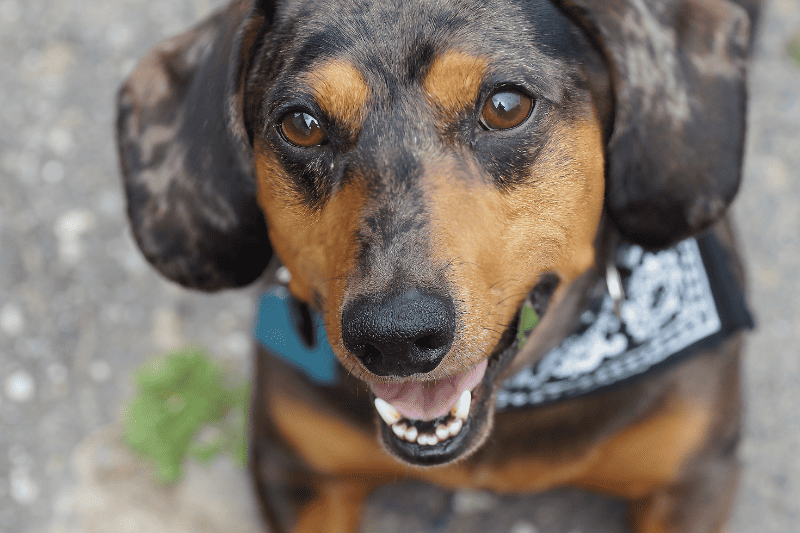Understanding Dachshund’s Bite Strength: What You Need to Know
Our beloved canine friends make for loyal companions; however, their unpredictability and aggression can pose a serious risk. The American Veterinary Medical Association reports that 4.5 million Americans are attacked by dogs every year. To ensure the utmost safety, it is of paramount importance to be aware of a dog’s bite strength to both prevent and treat future bites with care.
The Dachshunds have a reputation for being prone to biting. So, many people wonder about the Dachshund’s bite force and how it compares to other breeds. In this article, we will explore bite force in Dachshunds and other dogs, and provide tips for training and managing it.
Related post: When Wiener Dogs Attack: Causes and Prevention of Dachshund Bites

Understanding The Bite Force of Dachshunds
The bite force is the amount of pressure that a dog’s jaws can exert when biting down. It is measured in pounds-per-square-inch (PSI) and varies between breeds. Generally, larger breeds have a stronger bite force than smaller breeds due to their larger head and jaw sizes.
How Dachshunds Compare to Other Breeds
Although dachshunds are a small breed, they still have a relatively strong bite force compared to other dogs. According to a study, the average dachshund has a bite force of 125 PSI, which is weak compared to other breeds. But, dachshund’s teeth are very sharp so, even though their bite force is weaker than other breeds, they can still cause serious injury.
Factors Affecting Bite Force
Several factors can influence a dog’s bite force, including its breed, size, age, and health. Additionally, a dog’s temperament and training can also affect its bite force. For example, dogs trained to be guard dogs have a stronger bite than regular pet dogs.
Factors That Influence Dog Bite Strength
The strength of a dog’s bite can be influenced by various factors, including:
- Size and weight: Larger dogs generally have stronger bites than smaller dogs.
- Age: Puppies have weaker bites than adult dogs.
- Sex: Male dogs tend to have stronger bites than female dogs.
- Training: Dogs that have been trained for biting or protection may have stronger bites.
- Health: Dogs with dental problems or jaw injuries may have weaker bites.
What Dog Has the Weakest Bite Force?
Not all dog breeds have the same bite force. Some dog breeds have weaker bite force than others due to their genetics and selective breeding. One reason why certain dogs have weaker bite force than others is because of their smaller size. Smaller dogs may have weaker bite force than larger dogs because their jaw muscles are not as powerful.
One example of a dog breed with weaker bite force is the Chihuahua. with a bite force of around 100 PSI, these dogs have a weaker bite force due to their smaller size.
It is important to note that even dogs with weaker bite force can still cause injury or harm if they are not trained and socialized properly.
What Dog Has the Strongest Bite Force?
The dog breed with the strongest bite force is the Kangal, with a bite force of around 743 PSI. Other dog breeds with strong bite force include pit bulls, German shepherds, rottweilers, and Belgian malinois, with bite forces ranging from 235 to 328 PSI.
Dogs with stronger bite force have a greater potential for causing serious injury or harm. Overall, understanding bite force in dogs can help us to better understand and care for our furry companions.
Related post: Are dachshunds aggressive?

Do Dachshunds Bite the Most?
Compared to other dog breeds, dachshunds do not have the highest bite force. However, their bite force is still significant enough to be a cause for concern. Dachshunds have been known to bite more than other breeds due to their strong prey drive and tendency to be territorial.
Overall, while dachshunds do not have the highest bite force among dog breeds, they are still capable of causing harm if not trained and socialized properly. This is why dachshunds must be trained and socialized, to prevent them from acting aggressively and biting other people or animals. Proper dachshund training is essential for dachshund owners, to ensure that their dachshunds are well-mannered and obey commands.
Training and Managing Biting Dachshunds
To prevent potential problems with bite force, it’s important to train and manage your dachshund’s behavior from an early age. Here are some tips for training and managing bite force in dachshunds:
- Socialize your dachshund from a young age to help it become comfortable around people and other dogs.
- Use positive reinforcement training techniques to teach your dachshund appropriate behavior, such as not biting or mouthing.
- Provide plenty of chew toys and other outlets for your dachshund’s natural chewing behavior.
- Monitor your dachshund’s behavior and intervene if it shows signs of aggression or biting.
- Seek professional help from a dog trainer or behaviorist if your dachshund has issues with biting or aggression.
How to Prevent Dachshund Bites
Preventing dachshund bites starts with understanding the potential risks and taking steps to avoid them. Here are some tips for preventing dog bites:
- Never approach an unfamiliar dog.
- Avoid making direct eye contact with a dog.
- Do not disturb a dog that is sleeping, eating, or caring for puppies.
- Teach children how to interact with dogs safely.
- Keep your dog on a leash when in public.
- Socialize your dog to reduce fear and aggression.
What to Do If A Dachshund Bites You
If you are bitten by a dog, it’s important to seek medical attention immediately. Even a small bite can become infected and cause serious health problems. In addition, reporting the attack to animal control can help to prevent future incidents.
Related post: How do I stop my Dachshund from being aggressive?

Conclusion
Understanding the bite strength of dachshunds is an important part of responsible pet ownership and public safety. By following the tips outlined in this article, you can help prevent dog bites and keep yourself and others safe. If you are bitten by a dog, seek medical attention right away and report the incident to animal control.
It is important to remember that bite force alone does not determine a dachshund’s behavior or temperament. Proper training, socialization, and responsible ownership are key factors in preventing dog bites and ensuring the safety of both humans and animals.
Overall, dachshunds have a relatively weak bite force compared to other breeds, but proper training and management can help prevent potential problems. By socializing your dachshund early and providing it with outlets for its natural behaviors, you can help create a friendly and well-behaved companion.
With the right care, dachshunds can be great pets that are loyal and loving companions. If you have experience with dachshunds or other dog breeds, we would love to hear from you. Share your thoughts and experiences in the comments section below.
Thank you for reading, and stay safe around our furry friends!
Related post: Interesting facts about dachshunds that you didn’t know
Recent Posts
Calculate the perfect food portions for your dachshund with our specialized calculator. Get customized feeding recommendations based on size, age, and activity level to support your wiener dog's back...
Looking for the perfect gift for a proud dachshund mom? We’ve rounded up the cutest dachshund shirts that celebrate your love for wiener dogs in style. Whether you’re shopping for yourself or a...


